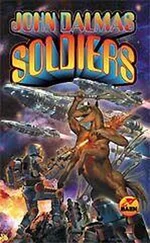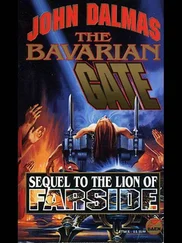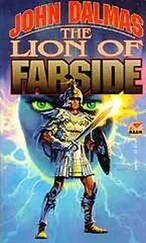John Dalmas - The Lion Returns
Здесь есть возможность читать онлайн «John Dalmas - The Lion Returns» весь текст электронной книги совершенно бесплатно (целиком полную версию без сокращений). В некоторых случаях можно слушать аудио, скачать через торрент в формате fb2 и присутствует краткое содержание. Жанр: Фэнтези, на английском языке. Описание произведения, (предисловие) а так же отзывы посетителей доступны на портале библиотеки ЛибКат.
- Название:The Lion Returns
- Автор:
- Жанр:
- Год:неизвестен
- ISBN:нет данных
- Рейтинг книги:4 / 5. Голосов: 1
-
Избранное:Добавить в избранное
- Отзывы:
-
Ваша оценка:
- 80
- 1
- 2
- 3
- 4
- 5
The Lion Returns: краткое содержание, описание и аннотация
Предлагаем к чтению аннотацию, описание, краткое содержание или предисловие (зависит от того, что написал сам автор книги «The Lion Returns»). Если вы не нашли необходимую информацию о книге — напишите в комментариях, мы постараемся отыскать её.
The Lion Returns — читать онлайн бесплатно полную книгу (весь текст) целиком
Ниже представлен текст книги, разбитый по страницам. Система сохранения места последней прочитанной страницы, позволяет с удобством читать онлайн бесплатно книгу «The Lion Returns», без необходимости каждый раз заново искать на чём Вы остановились. Поставьте закладку, и сможете в любой момент перейти на страницу, на которой закончили чтение.
Интервал:
Закладка:
The army's progress was less than swift. Here and there were rock falls, the source of the innumerable tumbled blocks of stone over and around which the Copper River rushed and romped. When the lead unit encountered a rock fall partly blocking the road, trumpets echoed through the gorge, stopping the column. Then men and horses went to work clearing the rock. Even so, at late dusk of the first day, the hindmost battalion had entered the gorge.
There wasn't a hint of rain, which was fortunate, because there was no place to pitch tents. Men and junior officers slept on or beside the road itself, on rock or rubble. Senior officers slept on pallets laid on hay. There was no forage along the road; the horses were skimpily fed from the fodder on the wagons. Klugnak hoped these mountains did not outlast the fodder supply.
At midmorning of the second day, the lead battalion-the command battalion-reached a remarkable bridge. Two massive stone piers arose from each side of the river, anchoring ropes made of steel wire. Ropes the like of which Chithqosz had never seen before. Suspended from them by similar but smaller ropes hung a bridge floored with thick, white-oak planks. The planks, like the cables, were ancient, made immune to decay by dwarven spells. Chithqosz sensed the spells as he crossed, and found them neutral, without threat.
A few hours later, scouts came back to report another suspension bridge, with a manned guard station at its far end. They'd seen it from a little distance, and believed the guards had seen them in turn. It seemed to Klugnak the scouts were uneasy about it, no doubt at the possibility they might be ordered to cross the narrow span in the teeth of crossbow fire.
"Continue the march," the general ordered. Thirty minutes later, the prince and the general could see the bridge ahead, and the guard station at its far end. The building was small, built of stone against a sheer rock face. A wooden barricade arm had been lowered, blocking the road. Even seen from a hundred yards away, the guards were short and broad, with disproportionately long arms. Lines in a book came to the minds of both voitar: "… savage warriors no higher in stature than the nipples of a man." A human man. "Short of leg but long of arm
… and no concept of mercy."
A chill bristled Klugnak's hair, but he rejected it. The warnings of sea dragons and serpents, bees the size of sparrows, great birds that killed and ate men-all had been fantasy. He turned to his aide. "I want the place captured and the guards taken prisoner. Kill them only if they resist."
The voitik major saluted sharply. "As you order, sir."
A squad of the prince's personal guard company-rakutur, voitik halfbloods-approached the guard station. Their sergeant ordered the two guards to put down their weapons. One of the guards skewered the sergeant with his spear. Within half a minute, both guards lay dead. But on the ground before them lay four rakutur-four rakutur!-two dead, one dying, and another whose next shirt would need only one sleeve.
Klugnak himself examined the building's interior. Despite the dwarves' short stature, the door was more than high enough to accommodate the towering voitu nicely, and two human soldiers could pass through it side by side if they chose. He wondered why. Actually it was to permit dwarves to hurry out with their weapons, including spears and poleaxes.
In back, the door leading into the mountain was little more than five feet high. To pass through it, a human would have to bend or crouch, a serious problem if it was defended from the other side. It opened into a large chamber with two rear entrances. One was an upward-slanting tunnel, polished slippery smooth, and too low for even a dwarf to stand in. The other was about six feet high, at the foot of steep stairs that climbed into darkness. All of which should have told Klugnak several things, as should the faint lingering odor of lamp smoke in the room. But his arrogance got in the way, and at any rate the die had been cast.
Outside the guard station, the rakutur destroyed the wooden bar that blocked the road, and the column moved on.
An hour later, a short stocky figure emerged from a tunnel eight hundred feet higher, and half a mile south of the gorge. The dwarf carried a trumpet as long as himself, and raising it, blew a single long piercing blast. Then he sat down to wait.
A short while later, a vulture-sized black bird arrived, resembling a large-headed raven with a crimson cap. It settled on a nearby pine.
"Everheart?" the dwarf called.
"Himself," the bird answered.
"How are yer nestlings?"
"Grown, flown, and on their own, I'm grateful to report. I am ready for another twenty-year vacation from parenting." The bird cocked his red-crowned head. "Why have you called on the great ravens?"
Like the dwarves, the great ravens were disinclined to involve themselves in politics. They didn't need enemies. But they had an agreement with the dwarves. The surface of the Silver Mountain kingdom was almost entirely wilderness. And there all the great ravens in that half of the continent built their nests and raised their young, untroubled by human predators.
"I've a report for the King in Silver Mountain," the dwarf said, then described the skirmish at the bridge.
Everheart didn't need to fly it to the king; the great ravens had their own hive mind. He simply needed to get the attention of others. Another of his kind, located near the palace, could deliver it much more quickly than he.
By late on the second afternoon, the river, though still boisterous, was smaller than it had been. From that, Klugnak judged that the lead battalion would reach the head of the pass late the next day, and start down the other side. After days of unbroken hazy sunshine, there now were tall clouds in the sky. He hoped it wouldn't rain. He felt a vague anxiety, and wanted to get out of the mountains as soon as possible. Again he did not halt for the day until dusk had thickened nearly into night.
Again they slept in the road, and again it did not rain.
A great raven had given the report to the King in Silver Mountain. The king had given him one in return, which the bird relayed to the entrance of the Great Northern Copper Lode. Production there was not what it had been a century earlier. But still there were more than three hundred adult male dwarves within a five-hour speed march of the head of the pass, and as many more within nine hours. The speech of message gongs sounded throughout the networks of drifts, dwelling areas, and utility and connecting tunnels, inspiring swift but organized activity.
Shortly after noon the next day, the lead battalion approached a third suspension bridge. There the river was a relatively modest stream. The road was cut into the south side, forty or fifty feet above the river, and the gorge walls, though still precipitous, were not so high as before. Clearly they were near the head of the pass.
The scouts had already crossed the bridge when their trumpeter blew a warning peal: danger!
It was a signal to more than the army's commanders. Within seconds, a swarm of crossbow darts hissed down from the opposite rim. Soldiers fell, along with voitar, horses, cattle. Nor did it seriously abate after the first volley. The dwarf physique is ideal for stirrup-cocked crossbows, providing a rate of fire not so inferior to that of an ordinary bow skillfully used. And their accuracy was excellent. Soldiers and animals panicked, filling the air with screaming, whinnying, bawling, and shouted curses. And trumpet blasts, which stopped the rearward battalions where they were. The panicked cattle were especially dangerous because of their horns. A number of men and horses were crowded off the edge of the road, to fall to the broken rocks along the river's edge.
Читать дальшеИнтервал:
Закладка:
Похожие книги на «The Lion Returns»
Представляем Вашему вниманию похожие книги на «The Lion Returns» списком для выбора. Мы отобрали схожую по названию и смыслу литературу в надежде предоставить читателям больше вариантов отыскать новые, интересные, ещё непрочитанные произведения.
Обсуждение, отзывы о книге «The Lion Returns» и просто собственные мнения читателей. Оставьте ваши комментарии, напишите, что Вы думаете о произведении, его смысле или главных героях. Укажите что конкретно понравилось, а что нет, и почему Вы так считаете.








